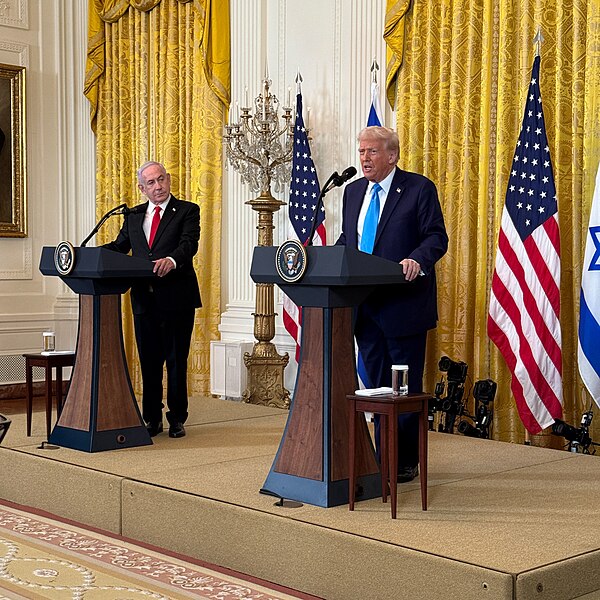Donald Trump has enacted an executive order that permits stringent economic sanctions against the International Criminal Court (ICC), alleging that the organization has engaged in “illegitimate and baseless actions” directed at the United States and Israel.
This order empowers the President of the United States to implement asset freezes and travel restrictions on ICC personnel and their family members if it is determined that they are involved in investigations or prosecutions of U.S citizens and certain allied nations.
This aggressive stance towards the ICC follows the court’s November decision to issue arrest warrants for Benjamin Netanyahu and his former defense minister, Yoav Gallant, in connection with alleged war crimes and crimes against humanity in Gaza.
In the executive order, Trump asserted that the ICC had “abused its power” by issuing these warrants, which he argued had “set a dangerous precedent” that jeopardizes U.S citizens and military personnel.
This detrimental behaviour poses a risk to the sovereignty of the United States and compromises the essential national security and foreign policy efforts of the U.S government and its allies, including Israel, he stated.
Neither the United States nor Israel are signatories to the International Criminal Court (ICC), which serves as a permanent tribunal for prosecuting individuals accused of serious crimes. In his directive, Trump contended that the court should “honour the choice” of nations “to refrain from subjecting their personnel to the ICC’s authority.”
The Prime Minister of Israel expressed strong support for Trump’s decision. Netanyahu remarked: “Thank you, President Trump, for your courageous executive order regarding the ICC. It will protect both America and Israel from the anti-American and antisemitic corrupt court that lacks jurisdiction or justification to pursue legal actions against us.”
Trump asserted that the United States “will implement substantial and significant repercussions for those accountable for the ICC’s violations,” which may include freezing assets and property, as well as barring entry into the U.S for ICC officials and their families.
It remains uncertain whether the Trump administration will disclose the identities of specific individuals targeted by these sanctions. ICC officials are preparing for the possibility that sanctions could affect high-ranking members of the court, including its chief prosecutor, Karim Khan.
On Thursday, officials from the International Criminal Court (ICC) were engaged in discussions late into the night, anticipating updates from Washington regarding the extent of the sanctions and the specific officials who would face individual repercussions.
The issuance of the order followed closely after President Trump’s meeting with the Israeli Prime Minister in the Oval Office. Netanyahu remained in Washington on Thursday, where he dedicated part of his day to discussions with lawmakers on Capitol Hill. A bill proposing extensive sanctions against the ICC had been stalled in the Senate the previous week due to a lack of support from Democratic members.
In reaction to Trump’s decision, Agnès Callamard, the Secretary General of Amnesty International, remarked that the order conveys the notion that Israel is exempt from legal accountability and the fundamental tenets of international justice.
She characterized the executive order as vindictive and aggressive, describing it as a severe action aimed at undermining the global legal framework that has been meticulously developed over many years, intended to ensure justice for all.
Other advocates expressed concern that imposing sanctions on court officials would create a chilling effect and contradict U.S. interests in various conflict regions where the court is conducting investigations.
“Victims of human rights violations globally rely on the International Criminal Court when they have no other recourse, and President Trump’s executive order will hinder their pursuit of justice,” stated Charlie Hogle, a staff attorney with the American Civil Liberties Union’s National Security Project.
The order raises significant First Amendment issues as it exposes individuals in the United States to severe penalties for assisting the court in identifying and investigating atrocities committed globally, regardless of the perpetrator.
Following the issuance of arrest warrants for Netanyahu and Gallant by ICC judges in November, the court has been preparing for potential retaliatory actions from the Trump administration.
Officials at the court, located in The Hague, Netherlands, express concerns that sanctions could represent an existential threat to the institution, which was founded in 2002 and has 125 member states that have ratified its founding statute.
Several sources within the ICC informed the Guardian last month that while sanctions against high-ranking court officials would be challenging, they would be manageable. However, sanctions affecting the entire institution would jeopardize its very existence by obstructing access to essential services necessary for its operations.
The order signed by Trump on Thursday indicates that the United States will focus on specific individuals listed in an annex to the document, although it remains unclear which individuals are included.
In 2020, under a separate but analogous executive order, Trump enacted travel bans and asset freezes against the ICC’s former prosecutor, Fatou Bensouda, a Gambian national, and one of her senior officials.
These measures were initiated in response to decisions made by Bensouda regarding war crimes investigations in Afghanistan and the occupied Palestinian territories. At that time, Bensouda was conducting a preliminary inquiry into allegations of crimes committed by Israel’s armed forces and Hamas.
In 2021, Bensouda escalated the case to a formal criminal investigation. The current prosecutor, Karim Khan, took over the inquiry and later intensified it following the Hamas-led attacks on October 7 and Israel’s subsequent bombardment of Gaza.






